Tortilla de patata is among the most traditional dishes of Spain. Surely if you were to ask most tourists, students studying abroad in Spain and indeed most Spaniards, what their favorite Spanish comfort food is, it would be tortilla de patata.
Tortilla de Patata: A Dish for Everyday People
Tortilla is prepared throughout Spain, but the most delicious tortilla I ever tasted was in a small cafeteria near Plaza de Ercilla in Bilbao when I first moved to Spain. Tortilla was their specialty and on any given day customers chose from ten or so varieties at the bar quickly before they disappeared. My favorite was a stack of two thin tortillas, filled with combinations of ham, cheese, tuna, lettuce, asparagus, tomatoes, shrimp, and mayonnaise. Other tortillas had combinations of ham, zucchini, onions, mushrooms, and chorizo sausage mixed throughout.
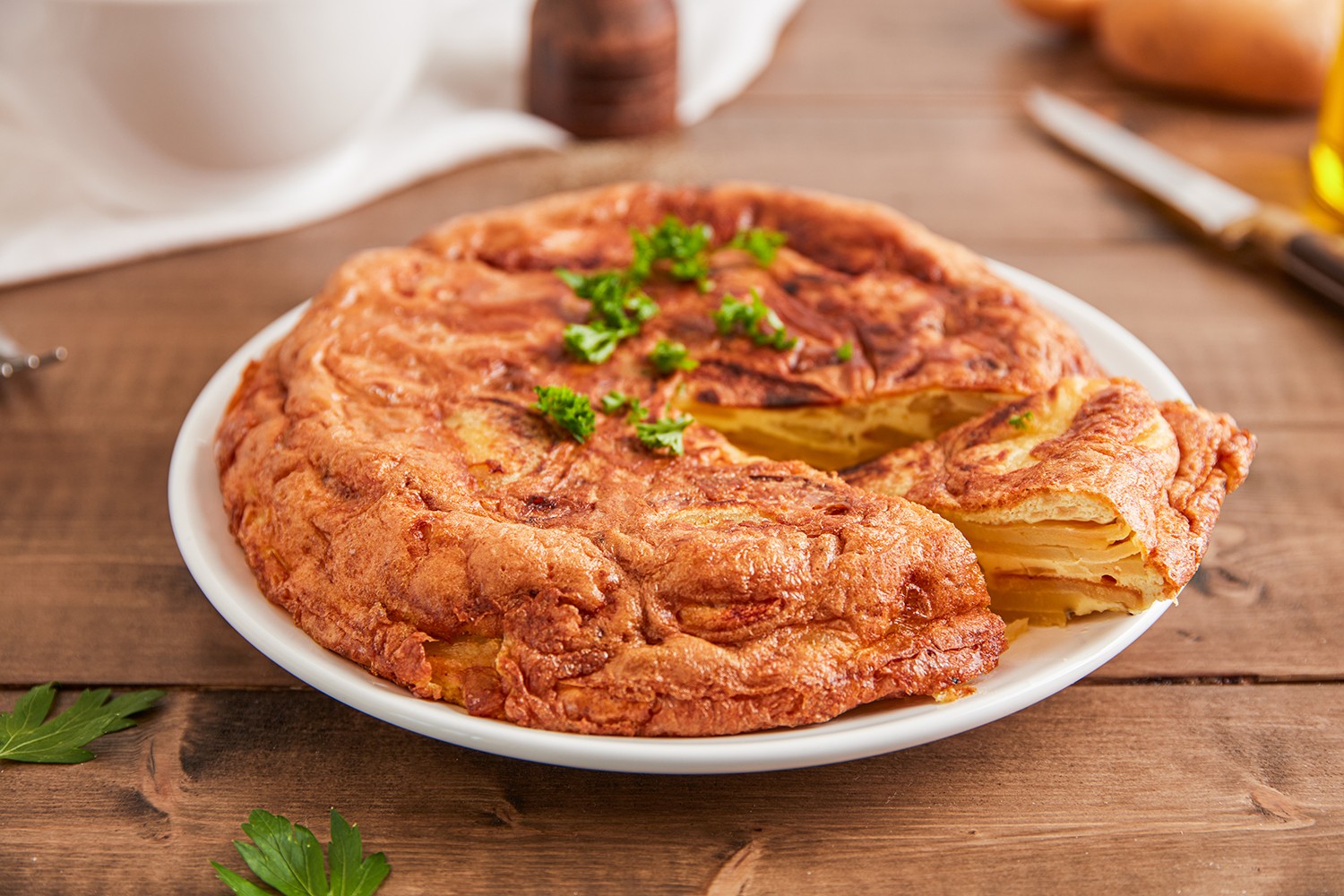
Early on when I first met my now husband Rafa in Albany NY, we would spend evenings cooking Spanish dishes, listening to flamenco and spanish indie, and getting to know each other. Of the many dishes we prepared, tortilla turned out to be the one that perhaps I now prepare most often and is loved by my adult children and extended family. It is a dish that is simple but requires practice before achieving the desired results.
How to Make the Perfect Tortilla de Patata
Keys to a successful tortilla are using a non-stick or well seasoned cast iron pan, a good quality olive oil, fresh eggs and golden potatoes. Be sure to let the potatoes cook in lots of oil until they are soft and start to brown. I usually add diced onion after 3 minutes or so. Drain the oil and store for another tortilla in the future. Mix eggs whisked with milk, salt and ground black pepper with the hot potatoes in a bowl and return to the pan. Allow the mixture to cook until bubbles appear.
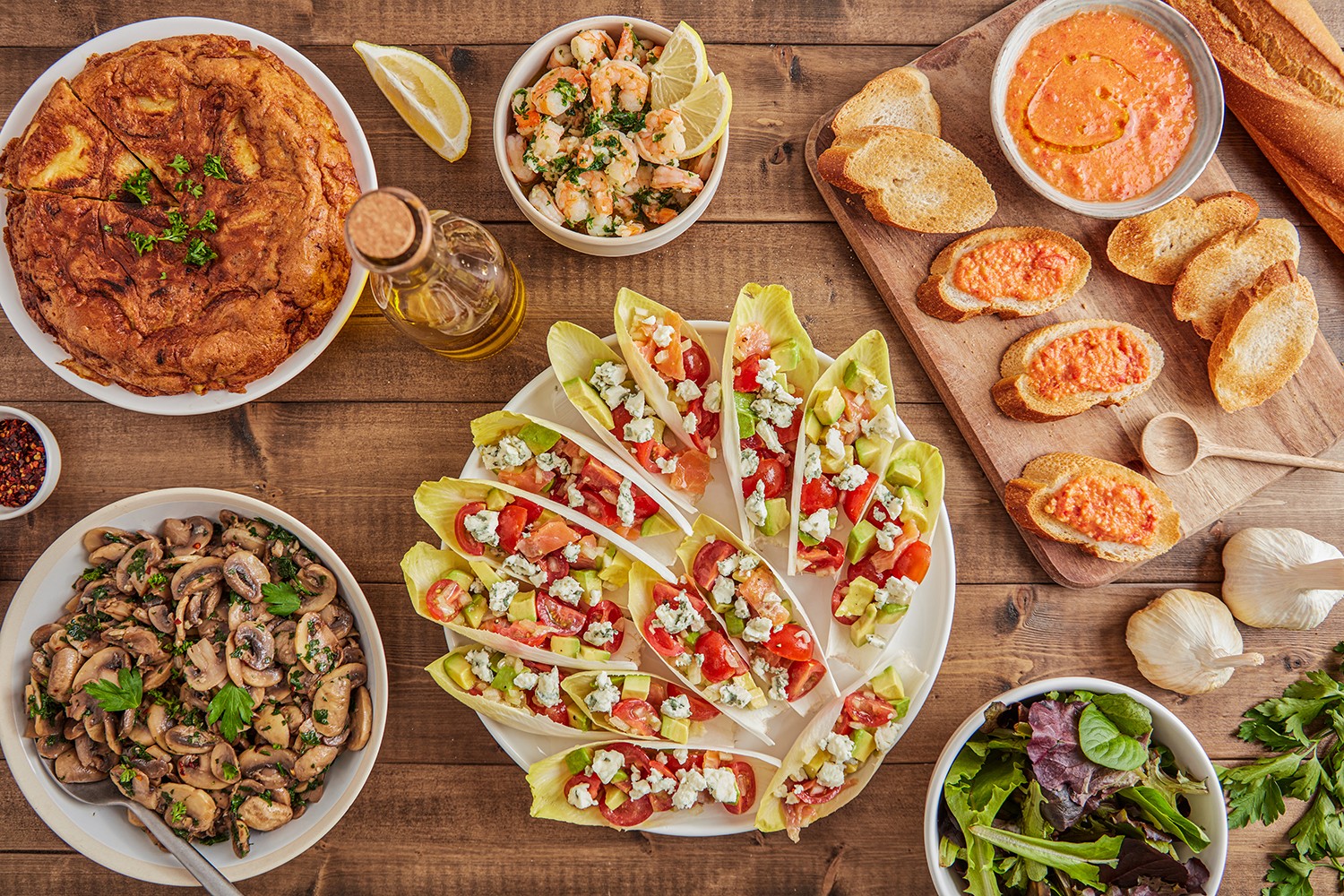
Here is the part that requires the most practice. Place a plate larger than the pan and carefully turn the pan upside down pressing the plate firmly to the pan with your other hand. Finally slide the tortilla back into the pan with a spatula and allow it to cook for a minute or so. With time you will decide if you prefer the tortilla to be more or less cooked. It isn’t as difficult as it sounds!
Tortilla is a great plate to bring to dinners with family and friends, a mouthwatering tapa cut in squares, and leftovers make for an amazing breakfast. Give it a few tries and play with combinations of additional ingredients. It will get better with each attempt. I promise.
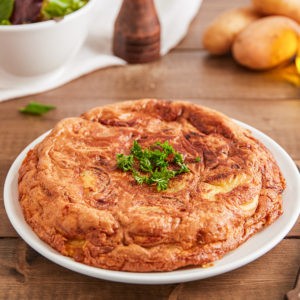
Tortilla De Patata
Ingredients
- 3 medium potatoes
- 1 onion, diced
- 1 cup extra virgin olive oil
- 3/4 tsp salt
- 1/4 tsp black pepper
- 5 eggs
- 1/4 cup milk (whole is best)
Instructions
- Wash and peel potatoes. Thinly slice using a grater, mandolin or knife.
- Heat oil on medium high in a non-stick frying pan (10' is good). Test for proper temperature by adding a piece of onion. If it sizzles then it is ready. Add onions to oil, then add potatoes. Turn the potatoes as they cook.
- Crack the eggs in a medium sized bowl with salt and pepper. Add milk. Whisk eggs and milk.
- Potatoes should begin browning. Turn every few minutes. When potatoes are beginning to brown and are tender, drain off the extra oil and reserve.
- Add drained potatoes and onion to bowl with whisked eggs and milk.
- Add some reserved oil to the pan. Pour egg, potato and milk mixture into the pan.
- Cook eggs on a medium heat. Make sure that eggs are not sticking to the pan by shaking. You should see bubbles coming up. Once you are sure that the eggs have set on the cooked side, and the eggs have begun to set on top, you can flip it. Cooks note: If you don’t want to flip the tortilla you can finish the cooking in the oven on broil if the frying pan is oven safe.
- To flip the tortilla, cover pan with a plate that is bigger than the pan. Flip the pan with the plate held tightly to the pan. The tortilla should come off onto the plate. Slide the tortilla back into the pan to cook the other side.
- Once the egg is firm and cooked through, flip the pan with a plate held firmly to the pan. The tortilla should come out right onto the plate. Serve on the plate.


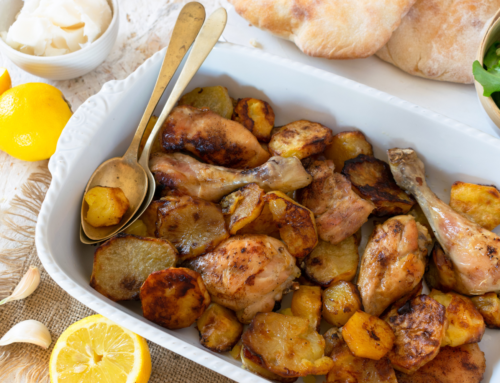
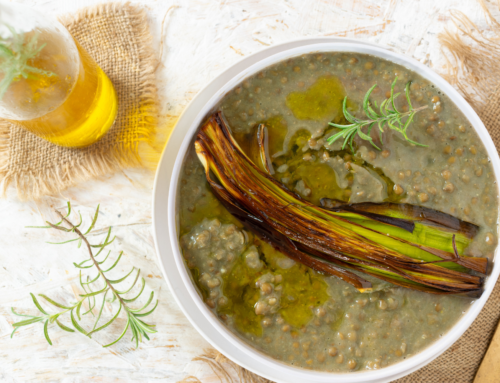
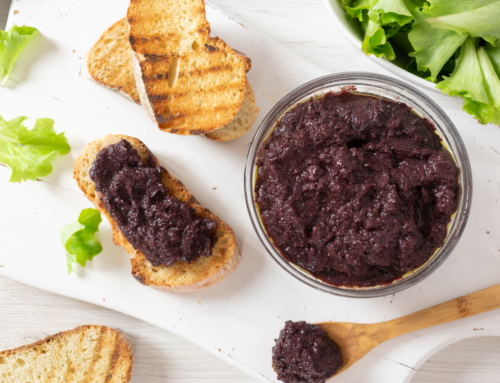

Oh, I almost forgot! The nutritional value that I wrote is based on a standard tapa or pincho size, which is 1/8th of the tortilla.
Here you go, so you can compare, the nutritional values for my delicious tortilla española made with zucchini instead of potatoes:
Calories: 162kcal
Carbohydrates: 5g
Protein: 8g
Fat: 13g
Saturated Fat: 3g
Polyunsaturated Fat: 2g
Monounsaturated Fat: 8g
Trans Fat: 0g
Cholesterol: 122mg
Sodium: 219mg
Potassium: 253mg
Fiber: 1g
Sugar: 2g
Vitamin A: 500IU
Vitamin C: 9mg
Calcium: 36mg
Iron: 1mg
My grandfather used to make a Spanish omelet with zucchini instead of potatoes. It’s an excellent option for anyone looking to cut down on calories since it has fewer carbs than the traditional version.
Also, the cool thing about using zucchini is that it cooks much faster than potatoes, so you can have your delicious omelet ready in a few minutes!
I made this for the first time this morning, and my wife and I mutually agreed that it was delicious! Flipping that pan though… Definitely needed to build up my upper arm strength! My only modifications were the addition of ramps (since they are in season now), and substituting goat’s milk kefir for regular milk.
I imagine it will be juicier, although I had never tried or made a Spanish tortilla with milk or black pepper before. Usually, the key to juiciness is to add plenty of well-cooked onion and not overcook the tortilla. If we don’t cook it too much, we should pasteurize the eggs beforehand.
Although there has always been a debate among chefs about whether or not to add onion to the tortilla. Certainly, there are many people in Spain who don’t like it with onion.
I made this for breakfast today. It was super easy and super delicious!
Try a slice of rustic bread or ciabatta spread with ‘ali-oli’ or ‘mahonesa’.
The “mahonesa” is a type of sauce made from a mixture of eggs, oil, salt, and lemon juice. It is a popular condiment in Spain, usually used as a dip for seafood, a spread for sandwiches, or a dressing for salads.
The original recipe for “mahonesa” comes from the Balearic Islands in Spain, and it differs from mayonnaise (a French later modification, following the invasion by Napoleon) in that it typically does not contain mustard or other flavorings.